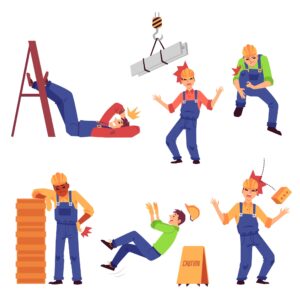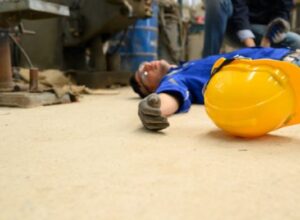By Stephen Bishop. Last Updated 9th May 2024. When it comes to accident at work claims, it’s natural to wonder how much compensation you could receive.
Many different accidents can happen in the workplace, including slips, trips, and falls and being struck by moving objects or vehicles.
So long as the incident was caused by someone else’s carelessness or negligence, and it happened within the past three years (unless the injury occurs over time), you will be able to make a claim.
This is something that our panel of personal injury solicitors have many years of experience in, and we can help you to get the full amount of compensation you deserve. For more information, please read on.
Call our claims helpline if you have any questions – 0161 696 9685
Jump to a Section:
- Eligibility Criteria For Accident At Work Claims
- Accident At Work Law
- Injury At Work Advice – Examples Of Evidence
- Accident At Work Claims Time Limit
- Accidents At Work Compensation Examples
- No Win No Fee Accident At Work Claims
Eligibility Criteria For Accident At Work Claims
While you are performing your work duties and in the workplace, your employer owes you a duty of care under the Health and Safety at Work etc. Act 1974. Per this duty, they must take reasonable steps to help prevent you from coming to harm while working. This could include ensuring you have been provided appropriate training to complete your work duties and risk assessing the workplace regularly.
Should they breach this duty, you could be injured in a workplace accident. However, all accident at work claims need to meet the following eligibility requirements in order to be valid:
- A duty of care must have been owed to you by your employer.
- They must have failed to adhere to this duty.
- This breach of duty caused you to suffer an injury.
To discuss the eligibility of your case today, you can contact one of the friendly advisors on our team.
What Types of Accidents At Work Could I Potentially Claim For?
There are many ways that you could be injured in an accident at work due to your employer’s negligence. Some examples may include:
- Ladder accidents – Various jobs involve having to use a ladder, such as retail jobs or if you work in a warehouse. If your employer was aware of a faulty ladder but had taken no steps to fix or replace it, this could lead to you falling off a ladder and injuring yourself.
- Slips and trips – Your employer may also be liable if you tripped or slipped at work. For example, if your employer failed to secure some cable wires, this could cause you to trip on them and suffer a leg injury.
- Defective machinery – If your employer failed to regularly maintain vital machinery at your job, this could lead to it malfunctioning, and you could become injured.
No matter the nature of the accident or the injuries you suffered, you must prove that your injuries were directly caused by your employer breaching their duty of care in order to be eligible to claim.
Contact our advisors today to find out whether you may be eligible for compensation. They may also be able to connect you to a work injury lawyer from our panel.
Accident At Work Law
There are several important pieces of legislation that have been put in place to protect you from risks in the workplace and which detail the steps employers need to take. This includes the following:
- Health and Safety at Work etc Act 1974
- Construction (Design and Management) Regulations 2015
- Supply of Machinery (Safety) Regulations 2008
- Control of Noise at Work Regulations 2005
- Control of Vibration at Work Regulations 2005
- Management of Health & Safety at Work Regulations 1999
- Working Time Regulations 1998
- Provision and Use of Work Equipment Regulations 1998
- Personal Protective Equipment (PPE) at Work Regulations 1992
- Manual Handling Regulations 1992
- Electricity at Work Regulations 1989
If your employer has failed to abide by the legislation in place, and you have been injured as a consequence, you will definitely have grounds for making a personal injury claim.
Injury At Work Advice – Examples Of Evidence
In order to make a successful injury at work claim, you will need evidence to improve your chances of being awarded compensation. Whether you suffered harm from a slip, trip or fall, or a manual handling injury, it is still essential that you can provide proof of your injuries and the negligence that caused them.
After an injury at work, our advice would be to gather some of the following forms of evidence:
- Witness contact details: Ask for the contact information of any witnesses to your accident. Their statements can provide evidence of what happened and who was liable.
- Medical evidence: It’s important to see a medical professional about your injury as they can put together a medical report, which can prove the extent of your injuries. Hospital records can also show that you were injured.
- Photographs: You could gather photographic evidence of your injuries and any hazards in the workplace that may have caused your accident.
- CCTV footage: You could request CCTV footage from your employer if your workplace has any CCTV installed on the premises.
- Workplace logbook: Any workplace with over 10 employees should have an accident logbook on site where details of your accident should be recorded. This could be used a evidence of your claim.
Speak to our advisors for free advice on gathering evidence. Furthermore, they could put you in touch with an expert accident at work solicitor from our panel.
Accident At Work Claims Time Limit
There is a three-year accident at work claim time limit to begin legal proceedings for your workplace injury. This time limit runs from the accident date and is set out within the Limitation Act 1980. However, some accident at work claims will have exceptions applied to them. These include:
- Those who lack the mental capability to handle their own claim will have the time limit suspended. In the event that they regain this mental capability, the time limit will run from the date of recovery.
- Those injured as minors will have the time limit suspended until their 18th birthday. From which, they will then have until their 21st birthday to begin a claim.
The court can appoint a litigation friend to claim on the injured party’s behalf while the time limit is suspended.
To see whether you are still within the time limit to start a personal injury claim, you can contact our team of advisors.
Accidents At Work Compensation Examples
A payout for a successful accident at work claim could include general damages and special damages. General damages compensate you for the pain and suffering caused by your work accident injuries.
The table included below includes some of the compensation guidelines found in the Judicial College Guidelines (JCG). This document may be used by those valuing your accident at work compensation claim for general damages, since it lists various types of injuries alongside guideline compensation brackets.
Take note that the table below should be viewed as a guide only and the first entry in the table is not taken from the JCG.
Injury Comments Amount
Multiple Serious Injuries and Financial Expenes Compensation for multiple severe injuries suffered and financial expenses such as prescription fees, care costs, travel fees and lost earnings. Up to £1,000,000+
Quadriplegia/Tetraplegia At the mid range of this bracket, payout is for cases where the claimant has an expectation of life of 25 years or more. They will have full awareness of their disability and not be in physical pain, and they will have retained powers of hearing, sight, and speech. £396,140 to £493,000
Paraplegia The level of award will be determined by age and life expectancy, depression, the degree of independence, and the presence and extent of pain. £267,340 to £346,890
Back Injuries - Severe (i) Severe damage to the spinal cord and nerve roots. These lead to serious consequences that are not normal for common back injuries. £111,150 to £196,450
Back Injuries - Minor (i) A full recovery takes place within 5 years from a soft tissue injury, sprain or strain. £9,630 to £15,260
Arm Amputations (b) (i) One arm is amputated at the shoulder. No less than £167,380
Neck Injuries - Severe (ii) Serious disc damage in the cervical spine or fractures that cause disabilities of considerable severity. £80,240 to £159,770
Neck Injuries - Moderate (ii) Wrenching-type injuries or soft tissue injuries that cause symptoms including recurring pain and serious movement limitation. £16,770 to £30,500
Knee Injuries - Severe (ii) Impaired agility and limited movement due a leg fracture that has extended into the knee joint. £63,610 to £85,100
Minor eye injuries Minor injuries include the likes of being splashed by liquids, exposure to fumes including smoke, and being struck in the eye, which causes some temporary interference with vision and initial pain. £4,820 to £10,660
If you successfully receive general damages, then you may also receive special damages as part of your accident at the workplace compensation. This compensates you for the financial expenses or losses you’ve experienced due to your injuries. Examples of losses that may be covered by your claim include:
- Loss of earnings if your injuries have forced you to take unpaid time off work during your recovery.
- The cost of certain medicines and treatments or physiotherapy.
- Travel expenses to vital appointments.
Evidence to help you claim special damages as part of your compensation may include documents such as bank statements or wage slips.
Contact our advisors for free today for more advice on how much work injury compensation you could potentially claim.
No Win No Fee Accident At Work Claims
One of the key features associated with our service is that our panel of accident at work solicitors can work on your case on a No Win No Fee basis. This means that anyone with a valid claim can claim, irrespective of his or her financial situation. This is because you will only need to pay legal fees if we manage to successfully secure compensation for you.
If for some reason, your case is not a success, you won’t need to pay a penny. Not only does this give you peace of mind, but it assures you that we will only take on your case if there is a genuine chance of it being successful. We will never waste your time. If you opt to claim an hourly solicitor, there is always the chance that they will take on your case irrespective of the likely outcome, simply to take your money.
You can speak to an adviser for free now, by:
- Calling us on 0161 696 9685
- Using the information on our contact us page
- Using the live chat feature
Consultations are free, and could help you start your claim today
Learn More About Accident At Work Claims
Expenses and benefits for compensation for injuries at work
This takes you to the UK Government website, where you will find information on compensation for work injuries. You will find out whether you need to report such an incident to HM Revenue & Customs.
Citizens Advice Accidents at work overview
This link takes you to the Citizens Advice website, where you will find plenty of helpful information regarding accidents at work, including getting Statutory Sick Pay (SSP) when you cannot work.
Government’s Health and safety at work
This takes you to the Government’s A to Z guide on health and safety at work, including fire safety in the workplace, Health and Safety Executive (HSE), workplace temperatures, smoking at work, running a business from home, recruitment and disabled people, health and safety using farm vehicles and machinery, and health and safety on ships.
HSE Information about health and safety at work
This is a link to the UK’s official Health and Safety Executive (HSE) website. It has lots of information on health and safety at work.
NI Direct Accidents in the workplace
This link provides plenty of useful information for those in Northern Ireland that suffer accidents in the workplace, including reporting an accident at work, accident at work sick pay, and where you can get help.
Below, you can find some other guides that you may find useful:
- If you’ve stepped on a nail at work, this guide offers insight into your legal rights. Find out if you can claim compensation, average compensation payouts for foot injuries, and how to make a No Win No Fee claim.
- If you’ve suffered an injury at work caused by an accident with a pallet truck, you could be entitled to compensation. Learn all about your legal rights and potential compensation payouts here.
- Tiredness and fatigue can be major causes of accidents at work. You can head here to find out more in our detailed guide and what your legal rights are if this is the main cause of your injury.
- If you’ve suffered an injury at work due to a lack of proper training, you could be entitled to compensation. This guide offers lots of useful information on the likes of No Win No Fee agreements and compensation payouts.
- Accidents at work caused by tiredness and fatigue
- Claim compensation for slipping at work and hurting your back
- If you’ve suffered a back injury at work like a bulging disc, you could claim compensation if you can prove your employer was at fault. Learn more here.
- How to make an NHS accident at work claim
- How to claim compensation for an accident at work during your probationary period
- Why is it important to report accidents in the workplace?
- I was injured due to no workplace training, can I claim?
- How to claim for a back injury suffered while working for the NHS
- Office-based accident at work claims
- How to make a workplace back injury claim
- Employee rights after an accident at work
- Assault at work compensation claims
- Agency worker accident at work claims
- Tendon injury at work claims
- How to make a claim for an injury caused by defective work equipment
- How to claim for a back injury at work caused by lifting?
- Inadequate protective equipment compensation claims
- Ladder accident at work compensation claims
- Stuck in a lift at work? See if you can claim compensation
- Fatal accident at work claims
- Claiming when injured due to lack of work safety boots
- Manual handling claims
- Slip, trip, fall at workplace compensation claims
- Forklift accident compensation claims
- Warehouse accident claims
- Accident working abroad compensation claims
- Construction accident claims
- Self-employed accident at work claims
- Scaffolding accident compensation claims
- Could I be sacked for an accident at work claim?
- Firefighter injured at work claims
- Employers’ responsibilities after a work accident
- Claim for carbon monoxide poisoning at work
- I did not take time off work after an accident, could I claim?
- Chemical burn at work – can I claim compensation?
- Claiming for a work accident after leaving the company
- Do employers pay for work-related injury claims?
- Do you have to be an employee to make a work accident claim?
- Time limits for work injury claims
- Part-time employee injury claims
- I got hurt at work, do I need a lawyer?
- The personal injury claims process explained
- Temporary worker’s rights to claim compensation
- The Management Of Health And Safety At Work Regulations 1999
- Who to notify if a fatal accident occurs at work?
- How to use an accident at work claim calculator
- Fatal accident at work claims guide
- Contractor injured at work – can you claim?
- How many lone workers are attacked every day?
- Bulging disc workers’ compensation claims
- How To Claim Industrial Accident Compensation
- Forklift Accident Claims Explained
- Farm Accident Compensation Claims
- Scaffolding Accident Compensation Claims
- How To Make A Factory Accident Claim
- How Long Do You Have To Claim For An Accident At Work?
- Lack Of Manual Handling Training At Work Caused An Accident – Can I Claim?
- Claiming For Injuries Due To A Broken Handrail At Work
- Claiming For An Accident With A Pallet Truck
- Lifeguard Injury At Work – Who Could Make A Claim?
- Accidents And Injuries Caused By Obstructed Walkways – Can I Claim?
- Stepping On A Nail At Work Caused An Injury – Can I Claim?
- Learn about accident at work procedure in the UK and get more help with our guide.
We hope reading our guide, which explores how much compensation for accident at work claims you may receive, has been useful for you.




